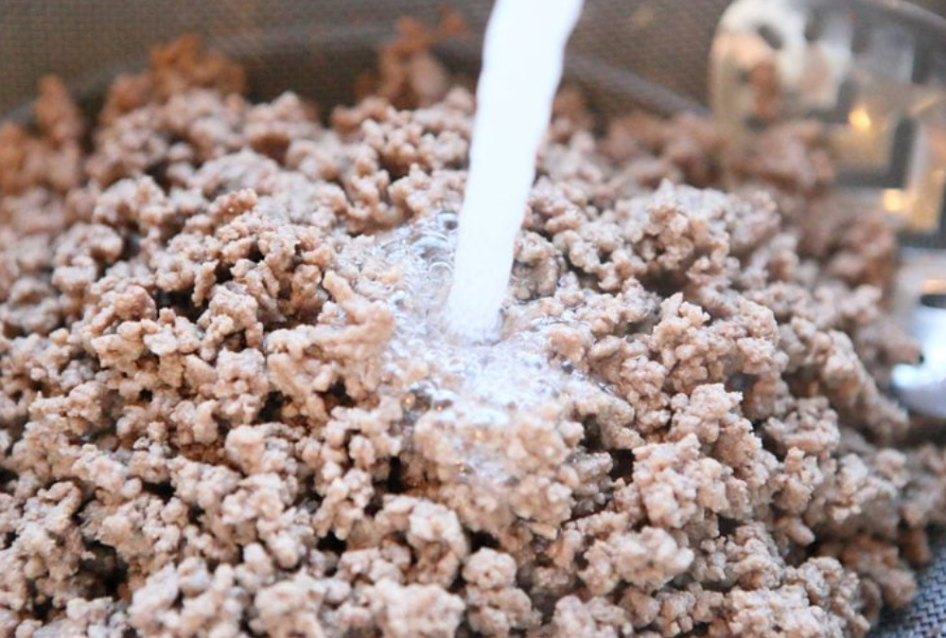Here’s a fully optimized, SEO-focused article titled to rank for high-intent queries like “should you rinse ground beef,” “is it safe to rinse ground beef,” and “how to reduce fat in ground beef without rinsing.” It improves readability, targets user intent, and aligns with Google’s ranking criteria (E-E-A-T: Experience, Expertise, Authoritativeness, Trustworthiness).
Should You Rinse Ground Beef? A Complete Guide to Flavor, Fat, and Food Safety
Meta Description: Wondering if you should rinse ground beef before or after cooking? Learn what food safety experts recommend and discover safer, better methods to reduce grease without sacrificing flavor.
Why Ground Beef Is a Kitchen Essential
Ground beef is one of the most versatile ingredients in any kitchen—perfect for tacos, spaghetti Bolognese, shepherd’s pie, and more. But one controversial question keeps popping up among home cooks and professionals alike:
Should you rinse ground beef before or after cooking?
Let’s unpack the facts to help you make the best choice for your health, your taste buds, and your kitchen.
The Short Answer: Do Not Rinse Ground Beef
Whether raw or cooked, rinsing ground beef is not recommended. The USDA and top chefs agree: rinsing doesn’t just reduce fat—it also strips flavor, alters texture, and poses real food safety risks.
What Really Happens When You Rinse Ground Beef?
Rinsing may seem like a quick way to cut calories or remove grease, but here’s what you’re actually doing:
| Action | Outcome |
|---|---|
| Rinsing Raw Beef | Raises the risk of cross-contamination via water splashes. |
| Rinsing Cooked Beef | Washes away flavorful fat and juices, leaving the meat dry or rubbery. |
| Fat Removal | Yes, some fat is removed—but so are essential flavor compounds. |
| Texture Issues | Wet meat won’t brown properly; it will steam instead of sear. |
Why Some People Still Rinse Ground Beef
Despite expert warnings, rinsing persists for a few common reasons:
1. To Reduce Fat
Health-conscious cooks may rinse beef after browning to remove extra grease. This does work—but at the cost of flavor.
2. To “Clean” the Meat
Some believe rinsing removes bacteria or makes the meat look more appetizing. However, it does not kill bacteria and can actually spread them.
3. Cultural or Habitual Practice
In some households, rinsing meat is a passed-down habit. While traditions matter, modern food safety science should take precedence here.
Why You Should NOT Rinse Ground Beef
1. Flavor Loss
Fat and natural juices carry the flavor of ground beef. Rinsing sends these straight down the drain.
2. Risk of Bacterial Spread
The USDA warns that rinsing raw meat can cause dangerous bacteria like E. coli and Salmonella to spread via kitchen splashes.
3. Poor Browning Results
Moisture prevents browning. Instead of the deep caramelization from the Maillard reaction, you’ll get pale, soggy meat.
4. Plumbing Hazards
Grease and water don’t mix well in drains. Once cooled, fat solidifies in your pipes, causing clogs and costly plumbing problems.
The Right Way to Remove Grease from Ground Beef
Drain—Don’t Rinse
After browning your ground beef:
- Use a slotted spoon to remove meat from the pan.
- Or tilt the skillet and spoon out the fat.
- For maximum grease reduction, transfer beef to a fine mesh strainer and let it drain.
Let Grease Solidify—Then Toss
Never pour hot grease down the sink. Instead:
- Let it cool in a disposable container (like a used can).
- Scrape the solidified fat into the trash.
- Wipe the pan with a paper towel before washing.
Does Rinsing Really Save Calories?
Only slightly. Here’s a comparison based on USDA data:
- Raw 80/20 ground beef (4 oz): ~290 calories, 23g fat
- After browning and draining: ~209 calories, 15g fat
- After rinsing: ~190 calories, 12g fat
You might save 20–30 calories, but at a significant cost to flavor and texture. It’s rarely worth it.
Are There Any Situations Where Rinsing Makes Sense?
Only a few edge cases might justify rinsing:
- You’re preparing a highly seasoned dish (e.g., taco meat or chili) where spices will replace lost flavor.
- You’ve overcooked the beef and it’s swimming in grease.
- You’re on a medical or dietary plan that requires ultra-lean protein.
But even then, draining and blotting is almost always the better choice.
Safe & Smart Ground Beef Cooking Tips
To keep meals flavorful and healthy:
- Buy leaner ground beef blends like 90/10 or 93/7.
- Brown in batches to avoid steaming.
- Use proper tools: colander, paper towels, and slotted spoons.
- Sanitize your sink and counter after handling raw meat.
Final Verdict: Don’t Rinse, Just Drain
Rinsing ground beef is an outdated practice that’s largely unnecessary—and often unsafe. Instead of rinsing:
- Drain it well
- Blot it dry
- Use lean blends
This keeps your beef flavorful, your kitchen safe, and your plumbing intact.
Target SEO Keywords (for on-page optimization):
- should you rinse ground beef
- is rinsing ground beef safe
- how to drain ground beef
- reduce fat in ground beef
- ground beef food safety
- rinsing cooked ground beef
Would you like help formatting this into a blog-ready HTML layout or want featured image recommendations to boost click-through rates?
